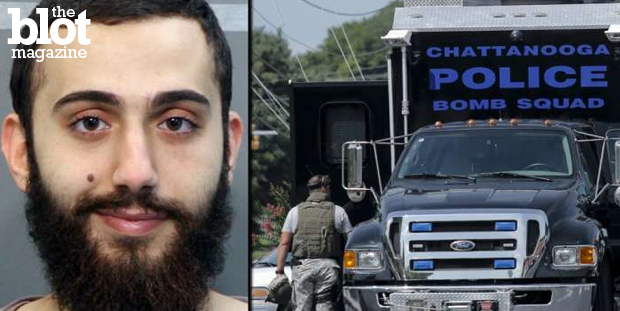
Days after a 24-year-old Tennessee man opened fire on two military recruitment centers in the city of Chattanooga, the motive for the attack that killed four Marines and a sailor remains a mystery to most.
In various press conferences held hours after the attack, federal law enforcement officials appeared to struggle for a reason why Muhammad Abdulazeez would carry out Thursday’s mass shooting that stretched 15 miles from one military recruitment center to its end inside the gates of a reserve facility. At those media briefings, public officials claimed they were still looking for clues about what led up to the shooting and urged members of the public to contact them via a hotline if they had any information about Abdulazeez.
On the day of the shooting, two people were briefly taken into police custody at Abdulazeez’s home in Hixson, a nearby suburb. Those people, identified by some local media reports as family members of the gunman, were said to be “cooperative,” according to law enforcement.
On Saturday, relatives of Abdulazeez issued their first public statement expressing their sympathies to the victims of the shooting. In it, they also suggested that the cause of his crime might have stemmed from a long battle with depression.
“For many years, our son suffered from depression,” the statement said. “It grieves us beyond belief to know that his pain found its expression in this heinous act of violence.”
Investigators say they are examining all aspects of Abdulazeez’s life, including statements and text messages he reportedly wrote prior to the shooting and his recent travels to Jordan and Kuwait. At least one friend of the shooter said those travels affected him both emotionally and mentally.
“Something happened over there,” Chattanooga resident Abdulrazzak Brizada told CNN. “He never became close to me like he was before he went overseas.”
Depression: Sorting Fact from Fiction
The shooting in Chattanooga is the second prominent incident of mass slaughter this year to be carried out by an individual said to have been afflicted with depression, a mental condition that is said to affect more than 40 million Americans in the United States.
In March, Andreas Lubitz started an international dialogue on depression after it was revealed the Germanwings pilot had seen a number of doctors for the ailment before deliberately flying a passenger jet into the side of a French mountain. The flight, Germanwings Flight 9525, was carrying 144 passengers and six crew members including Lubitz. All perished in the crash.
In the days and weeks after the crash, investigators focused on the pilot’s diagnosis and treatment for depression, including one doctor’s recommendation that he should not fly the day of the crash. The probe also centered on strict privacy laws in Germany, where Lubitz lived and was employed, that allowed the pilot to conceal his condition from his employer (Lufthansa, the company that owns Germanwings, said in a statement it was unaware of his condition before the crash).
Mental health advocates advised against pointing to Lubitz’s depression as the sole cause of the crash, saying the cause of the crash had yet to be fully understood (investigations, as of this writing, are still ongoing) and that blaming depression for the crash before all the facts are on the table would only further stigmatize the disorder.
“The assumption that his mental health was the sole reason 149 others died will do nothing to diminish the stigma attached to mental health problems,” Dr. Masuma Rahim, a clinical psychologist, wrote for The Guardian. “Fear and discrimination continue to discourage people from disclosing their problems and seeking help early on.”
Read more: Charleston: When Is an Act of Mass Murder Terrorism?
Dr. Rahim wrote that news organizations did more of a disservice focusing on the depression angle as the cause of the crash rather than sorting fact from fiction on the disorder.
“Media outlets could have used this tragedy to explore the impact of stress and to highlight the need for greater support,” Dr. Rahim wrote. “Instead some have chosen to vilify Lubitz and, by association, the millions who share his diagnosis. They have taken the easy option. Worse, they have added to the stigmatisation of a group that society already does a superb job of demonizing.”
While it is widely known that Lubitz received treatment for the disorder, it remains unknown if the same is true for Abdulazeez. Beyond the family’s own statement, there is little information about the Chattanooga shooter’s diagnosis or treatment for depression, if he received any diagnosis or treatment at all.
What is clear, based on information provided to the media by law enforcement, court documents and unnamed sources, is that Abdulazeez came from a middle-class family that had experienced some recent turbulence. His mother and father recently separated, according to court documents, and Abdulazeez himself was arrested in April after allegedly driving under the influence.
It is still not known why Abdulazeez chose to target military recruitment centers in the shooting last week. Federal law enforcement officials say they are investigating the incident as “an act of domestic terrorism” until the evidence points them elsewhere.
(Disclosure: The author of this post was diagnosed with depression as a child, and has received occasional psychiatric treatment as an adult.)
Matthew Keys is a contributing journalist for TheBlot Magazine.





